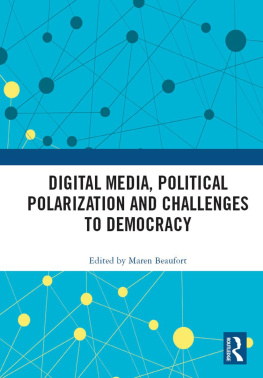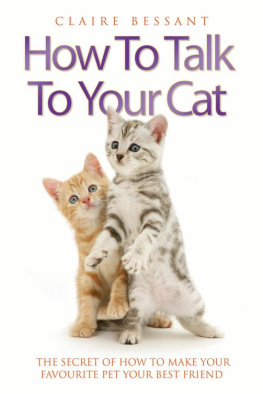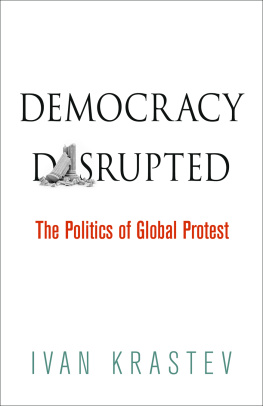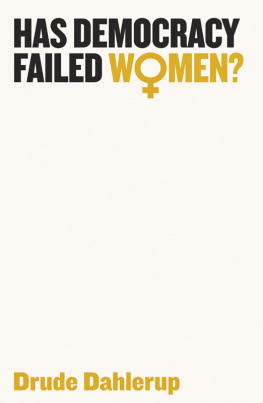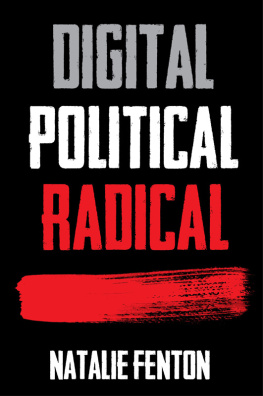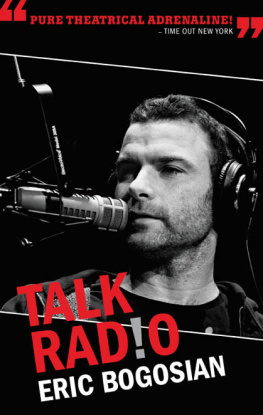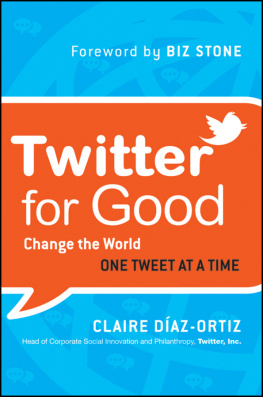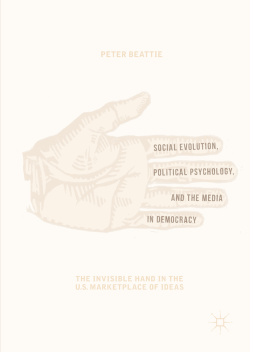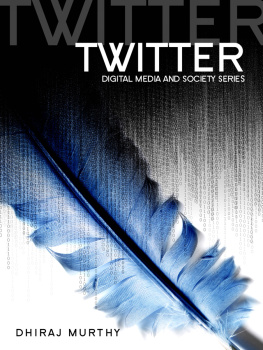Claire Bond Potter - Political Junkies: From Talk Radio to Twitter, How Alternative Media Hooked Us on Politics and Broke Our Democracy
Here you can read online Claire Bond Potter - Political Junkies: From Talk Radio to Twitter, How Alternative Media Hooked Us on Politics and Broke Our Democracy full text of the book (entire story) in english for free. Download pdf and epub, get meaning, cover and reviews about this ebook. year: 2020, publisher: Basic Books, genre: Politics. Description of the work, (preface) as well as reviews are available. Best literature library LitArk.com created for fans of good reading and offers a wide selection of genres:
Romance novel
Science fiction
Adventure
Detective
Science
History
Home and family
Prose
Art
Politics
Computer
Non-fiction
Religion
Business
Children
Humor
Choose a favorite category and find really read worthwhile books. Enjoy immersion in the world of imagination, feel the emotions of the characters or learn something new for yourself, make an fascinating discovery.

- Book:Political Junkies: From Talk Radio to Twitter, How Alternative Media Hooked Us on Politics and Broke Our Democracy
- Author:
- Publisher:Basic Books
- Genre:
- Year:2020
- Rating:3 / 5
- Favourites:Add to favourites
- Your mark:
- 60
- 1
- 2
- 3
- 4
- 5
Political Junkies: From Talk Radio to Twitter, How Alternative Media Hooked Us on Politics and Broke Our Democracy: summary, description and annotation
We offer to read an annotation, description, summary or preface (depends on what the author of the book "Political Junkies: From Talk Radio to Twitter, How Alternative Media Hooked Us on Politics and Broke Our Democracy" wrote himself). If you haven't found the necessary information about the book — write in the comments, we will try to find it.
Claire Bond Potter: author's other books
Who wrote Political Junkies: From Talk Radio to Twitter, How Alternative Media Hooked Us on Politics and Broke Our Democracy? Find out the surname, the name of the author of the book and a list of all author's works by series.
Political Junkies: From Talk Radio to Twitter, How Alternative Media Hooked Us on Politics and Broke Our Democracy — read online for free the complete book (whole text) full work
Below is the text of the book, divided by pages. System saving the place of the last page read, allows you to conveniently read the book "Political Junkies: From Talk Radio to Twitter, How Alternative Media Hooked Us on Politics and Broke Our Democracy" online for free, without having to search again every time where you left off. Put a bookmark, and you can go to the page where you finished reading at any time.
Font size:
Interval:
Bookmark:
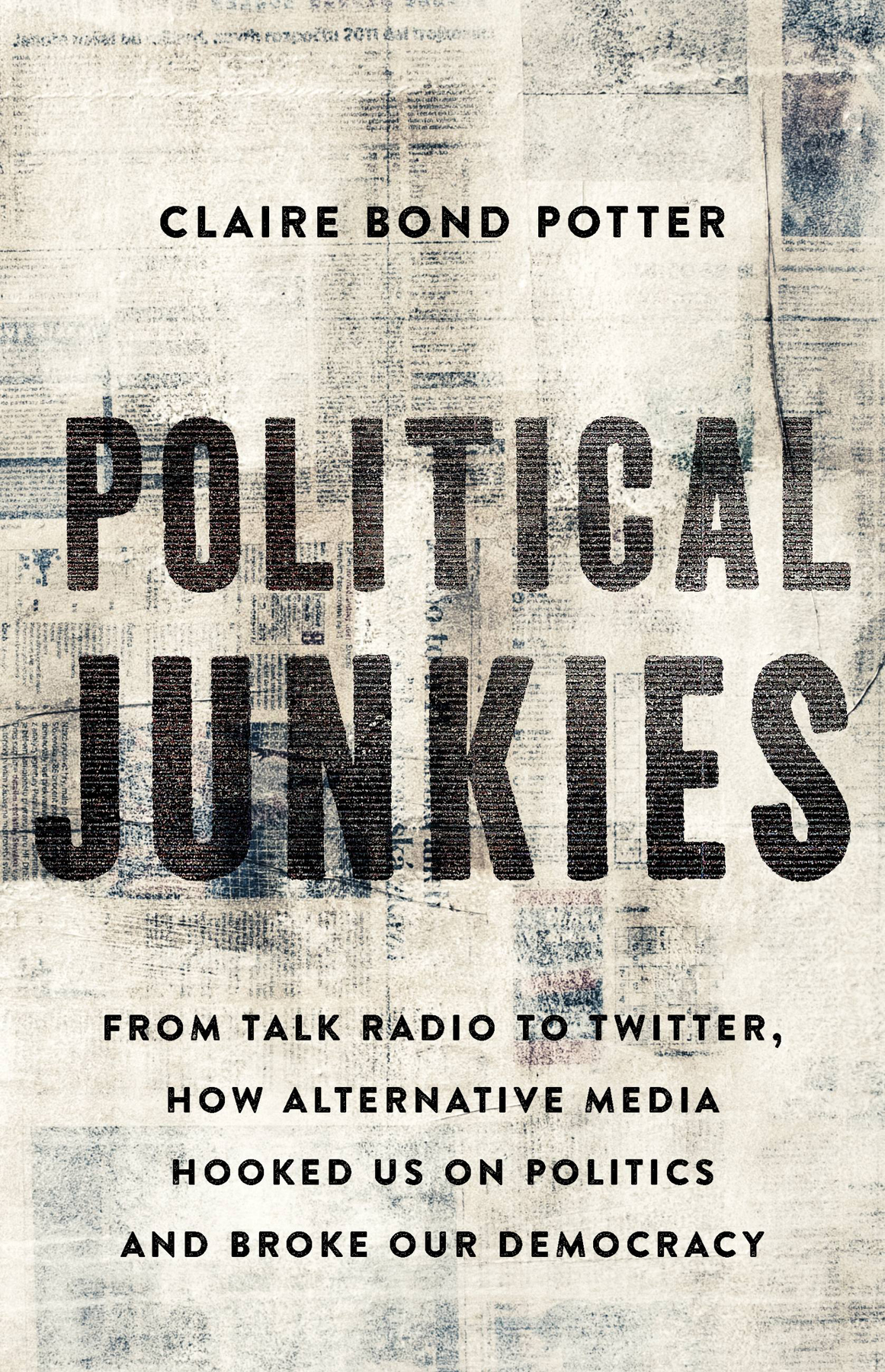
Copyright 2020 by Claire Bond Potter
Jacket design by Chin-Yee Lai
Jacket images @ Here / Shutterstock.com; @ Jason Javar Lawrence / Shutterstock.com
Cover copyright 2020 Hachette Book Group, Inc.
Hachette Book Group supports the right to free expression and the value of copyright. The purpose of copyright is to encourage writers and artists to produce the creative works that enrich our culture.
The scanning, uploading, and distribution of this book without permission is a theft of the authors intellectual property. If you would like permission to use material from the book (other than for review purposes), please contact permissions@hbgusa.com. Thank you for your support of the authors rights.
Basic Books
Hachette Book Group
1290 Avenue of the Americas, New York, NY 10104
www.basicbooks.com
First Edition: July 2020
Published by Basic Books, an imprint of Perseus Books, LLC, a subsidiary of Hachette Book Group, Inc. The Basic Books name and logo is a trademark of the Hachette Book Group.
The Hachette Speakers Bureau provides a wide range of authors for speaking events. To find out more, go to www.hachettespeakersbureau.com or call (866) 376-6591.
The publisher is not responsible for websites (or their content) that are not owned by the publisher.
Library of Congress Cataloging-in-Publication Data has been applied for.
ISBNs: 978-1-5416-4499-1 (hardcover), 978-1-5416-4500-4 (ebook)
E3-20200610-JV-NF-ORI
War on Crime:
Bandits, G-Men, and the Politics of Mass Culture
For Nancy Barnes
I arrived at the Gaylord National Resort and Convention Center in National Harbor, Maryland, after the Secret Service had locked it down. Vice President Mike Pence was giving a keynote, and no one was getting in until it was over. It was the last week in February 2018, and a swelling group of rueful Conservative Political Action Conference (CPAC) attendees had all made the same mistake. I sat down on a bench with a married couple: I learned that Kathy was a minister, and Jake was running for Congress in a Midwestern Republican primary. In addition to her storefront ministry, Kathy also had an internet radio show, which offered a Christian perspective on contemporary politics and culture. They were at CPAC to connect with Christian broadcasters and other alternative media outlets that might support Jakes campaign. The weekend would probably cost them over $2,000.
But what a weekend it is! Almost a half-century after its founding in 1974, CPAC exemplifies the divisive populisms that have been resurgent in American politics since the 1960s, a phenomenon that this book ties to the rise of alternative media.and televisions. CPAC is a feast designed for a political junkie like me, one who needs to leave New York Citys progressive media, and my own university, behind to immerse myself in conservative activism. My friend Ryan, an alternative media journalist, helped me connect to people in his network; and the live program allowed me to hear entire speeches, not just the decontextualized clips that appeared on the evening news. While the main stage featured numerous members of the Trump administration, as well as the president himself, the keynote speakers who created the most excitement were populist alternative media stars like Laura Ingraham, Ben Shapiro, and Sheriff David A. Clarke (a podcaster and one of fewer than a half-dozen African Americans on the program). Breitbart News editor Steve Bannon, a perennial favorite who had just lost his job as White House chief strategist, was notably absent, as were paleoconservatives and neoconservatives, a small coalition of intellectuals and politicians known as Never Trumpers who, together, have increasingly opposed the rise of populism in the Republican Party.
And of course, there was also Prison Hillary, an actor walking around in a striped jumpsuit, a blond wig, and a smiling Hillary Clinton mask, her handcuffed hands held out beseechingly.
Prison Hillary is a character we were all familiar with from the memes that showed up in our social media feeds during the 2016 campaign: Clintons agonized face, photoshopped behind bars. She is a fantasy, born on alt-right electronic forums and promoted by Trump partisans, a post-truth figure who does not represent the facts about Hillary Clinton, but rather what many populists feel is true about her.undermined a common idea of what news really is as well as what role the news should play in constituting a public square where everyone can agree on basic facts.
There is no more persuasive example of the importance of alternative media in contemporary conservative populism than CPAC, which devotes a substantial portion of its programming to alternative media workshops. Some helped students working at conservative campus publications get jobs at digital newspapers and web magazines. Others trained activists to become alternative media producers, offering tips and techniques for establishing and promoting a blog, podcast, or a YouTube channel. The media section in the main convention hall was jammed with correspondents from alternative operations: nearly all the women had long, dyed blond hair in imitation of stars like Ann Coulter, Laura Ingraham, and most of the female anchors on Fox News.
I quickly grasped how little of this vibrant and eclectic event was being covered in the mainstream media, even in conservative publications like the Wall Street Journal. On Broadcast Row, an exhibit hall of alternative media outlets just outside the main stage, producers like NRATV (a now-defunct operation established by the National Rifle Association, a major CPAC 2018 sponsor) were broadcasting live as crowds of conference attendees looked on. Podcasts of the keynote speakers were dropped on iTunes, Sound-Cloud, and Google Play minutes after they ended. On the lower level of the exhibition hall, I dodged a cardboard cutout of Senator Elizabeth Warren wearing a Plains Indian headdress and bumped into two talkative young women who, as college students, had established a thriving web magazine aimed at the campus right called Lone Conservative.
CPAC is an annual event where conservatives of all ages network, and it is a particularly important site for college students to become involved in a Republican Party that has enthusiastically given itself over to the internet, Donald Trump, and conservative populism. But its thriving alternative media exhibits were not unique. At Netroots Nation, the younger, progressive equivalent of CPAC, I would have seen a similar array of alternative media vying for the attention of Democrats. In 2019, the born-digital sites Alternet, RawStory, and Front Page Live, as well as an array of PACs, unions, and the Democratic National Committee, anchored the exhibit hall as premier sponsors. Lesser sponsors like Bonfire Media (which produces powerful and creative pieces that raise public awareness), the Center for Story-Based Strategy (harnessing the power of narrative for social change), Firefly Partners (custom digital solutions for progressive nonprofits), and SBD Digital (multiplatform matching to meet audiences where they are) testify to the extraordinary amount of influence that alternative media wields in contemporary American political culture. What progressive and conservative alternative media have in common is that they are explicitly ideological and seek to reach motivated audiences of political junkies.
Alternative media outlets, right and left, also position themselves against the so-called mainstream media, a collection of news outlets that they view as aligned with the interests of corporate and political elites. Also known as old media, traditional media, or legacy media, these newspapers and broadcasting companies are, or have evolved from, family-owned corporations that predated digital distribution. Most importantly, the mainstream media is viewed by alternative media outlets and the activists that patronize them as insufficiently ideological, part of a political, media, and corporate establishment that cannot be trusted to tell the truth or hold the powerful to account. Since its origins in the 1950s, alternative media has sought to recruit readers who were passionate about politics, to jolt Americans alienated from politics out of their apathy, and to cultivate activist information networks. And they have done this in the interests of a more transparent, inclusive, and principled politics that each side, conservative and progressive, believes would represent a fairer political system.
Font size:
Interval:
Bookmark:
Similar books «Political Junkies: From Talk Radio to Twitter, How Alternative Media Hooked Us on Politics and Broke Our Democracy»
Look at similar books to Political Junkies: From Talk Radio to Twitter, How Alternative Media Hooked Us on Politics and Broke Our Democracy. We have selected literature similar in name and meaning in the hope of providing readers with more options to find new, interesting, not yet read works.
Discussion, reviews of the book Political Junkies: From Talk Radio to Twitter, How Alternative Media Hooked Us on Politics and Broke Our Democracy and just readers' own opinions. Leave your comments, write what you think about the work, its meaning or the main characters. Specify what exactly you liked and what you didn't like, and why you think so.

